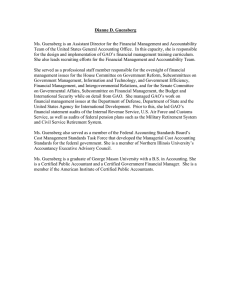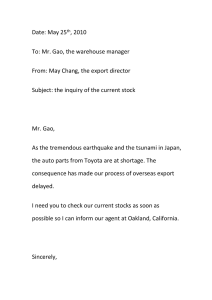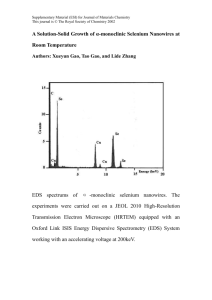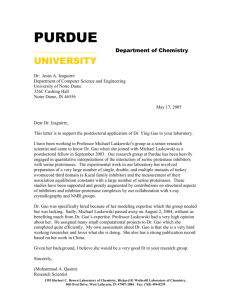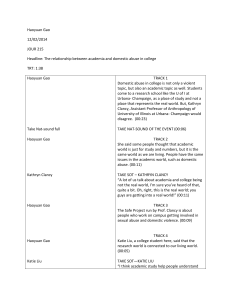Health Care in China lags behind Economic Developement
advertisement
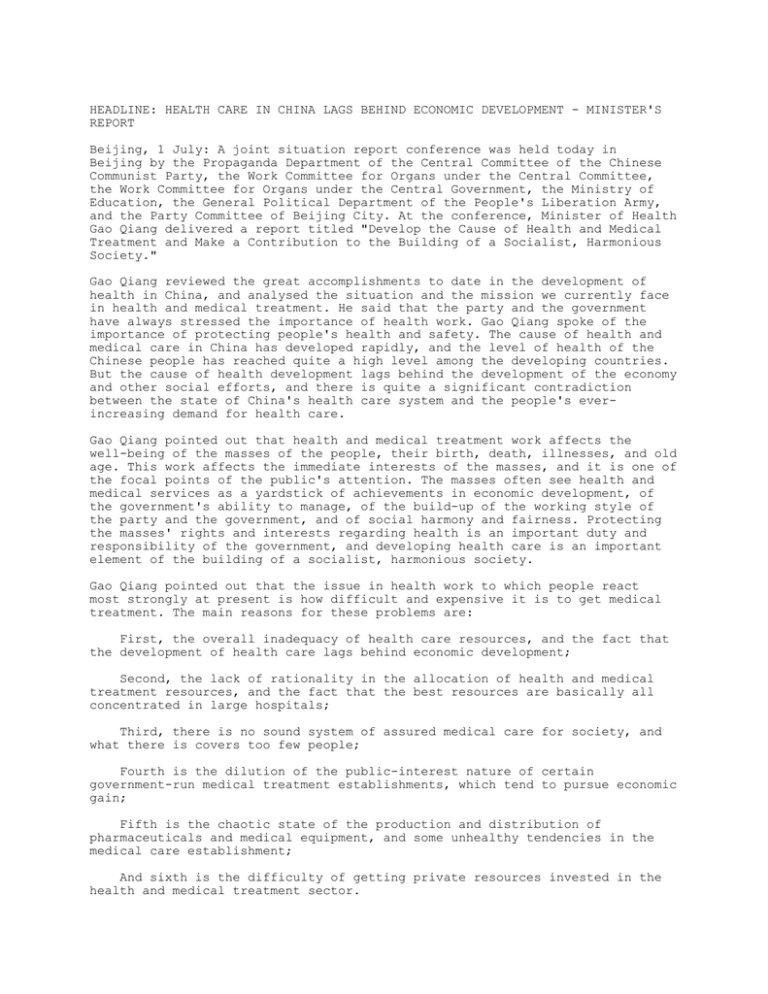
HEADLINE: HEALTH CARE IN CHINA LAGS BEHIND ECONOMIC DEVELOPMENT - MINISTER'S REPORT Beijing, 1 July: A joint situation report conference was held today in Beijing by the Propaganda Department of the Central Committee of the Chinese Communist Party, the Work Committee for Organs under the Central Committee, the Work Committee for Organs under the Central Government, the Ministry of Education, the General Political Department of the People's Liberation Army, and the Party Committee of Beijing City. At the conference, Minister of Health Gao Qiang delivered a report titled "Develop the Cause of Health and Medical Treatment and Make a Contribution to the Building of a Socialist, Harmonious Society." Gao Qiang reviewed the great accomplishments to date in the development of health in China, and analysed the situation and the mission we currently face in health and medical treatment. He said that the party and the government have always stressed the importance of health work. Gao Qiang spoke of the importance of protecting people's health and safety. The cause of health and medical care in China has developed rapidly, and the level of health of the Chinese people has reached quite a high level among the developing countries. But the cause of health development lags behind the development of the economy and other social efforts, and there is quite a significant contradiction between the state of China's health care system and the people's everincreasing demand for health care. Gao Qiang pointed out that health and medical treatment work affects the well-being of the masses of the people, their birth, death, illnesses, and old age. This work affects the immediate interests of the masses, and it is one of the focal points of the public's attention. The masses often see health and medical services as a yardstick of achievements in economic development, of the government's ability to manage, of the build-up of the working style of the party and the government, and of social harmony and fairness. Protecting the masses' rights and interests regarding health is an important duty and responsibility of the government, and developing health care is an important element of the building of a socialist, harmonious society. Gao Qiang pointed out that the issue in health work to which people react most strongly at present is how difficult and expensive it is to get medical treatment. The main reasons for these problems are: First, the overall inadequacy of health care resources, and the fact that the development of health care lags behind economic development; Second, the lack of rationality in the allocation of health and medical treatment resources, and the fact that the best resources are basically all concentrated in large hospitals; Third, there is no sound system of assured medical care for society, and what there is covers too few people; Fourth is the dilution of the public-interest nature of certain government-run medical treatment establishments, which tend to pursue economic gain; Fifth is the chaotic state of the production and distribution of pharmaceuticals and medical equipment, and some unhealthy tendencies in the medical care establishment; And sixth is the difficulty of getting private resources invested in the health and medical treatment sector. Gao Qiang said that the development of the cause of health must be coordinated with the nation's economic and social development, and the level of health support for the people must be commensurate with the level of economic development. Doing well in health and medical treatment work is an important duty of the government, a responsibility the government cannot relinquish. It is an effort requiring a concerted effort by government at all levels and concerned organizations, and a great deal of support from all of society. Under socialist market economy conditions, developing the cause of health requires that the government play the leading role, and it requires bringing in the market mechanism. But there are three fundamental principles which must not change. One is that there must be no deviation from a path which suits China's national conditions. Second is that the aim of serving the health needs of the people must not change. Third is there must be no change in the principle that responsibility for public health and protecting the health of our citizens rests on the shoulders of the government. In his report, Gao Qiang also gave a detailed explanation of the fundamental line of thought on health reform and development. The conference was chaired by Yang Yanyin, Deputy Secretary of the Work Committee for Organs under the Central Government. The conference was attended by cadres who are department/bureau or higher level officials on Party, government, and military staffs in the capital, and comrades in charge of concerned central enterprises or institutes of higher learning in the capital, over 800 people in all. Source: Xinhua news agency domestic service, Beijing, in Chinese 1307 gmt 1 Jul 05
